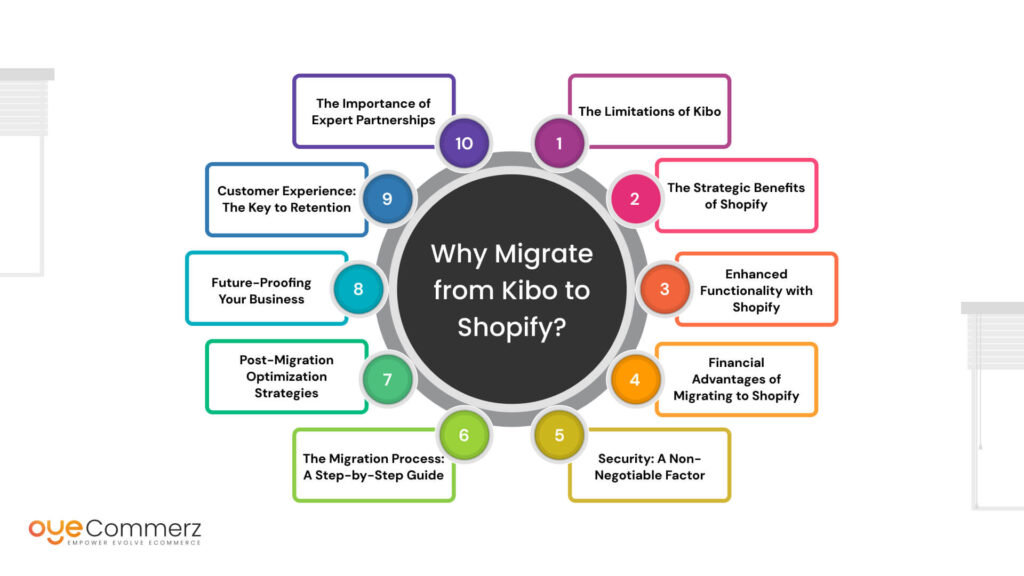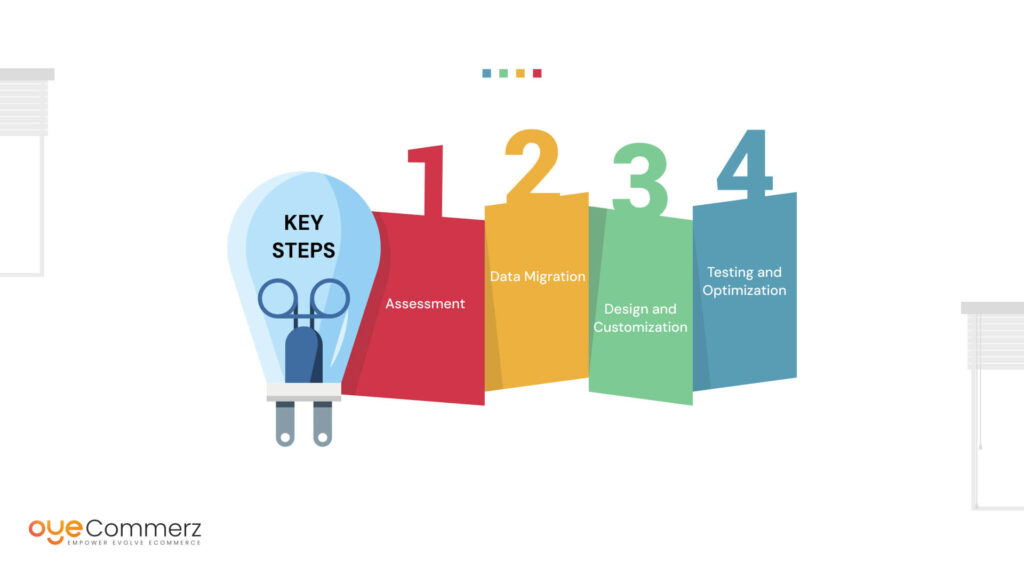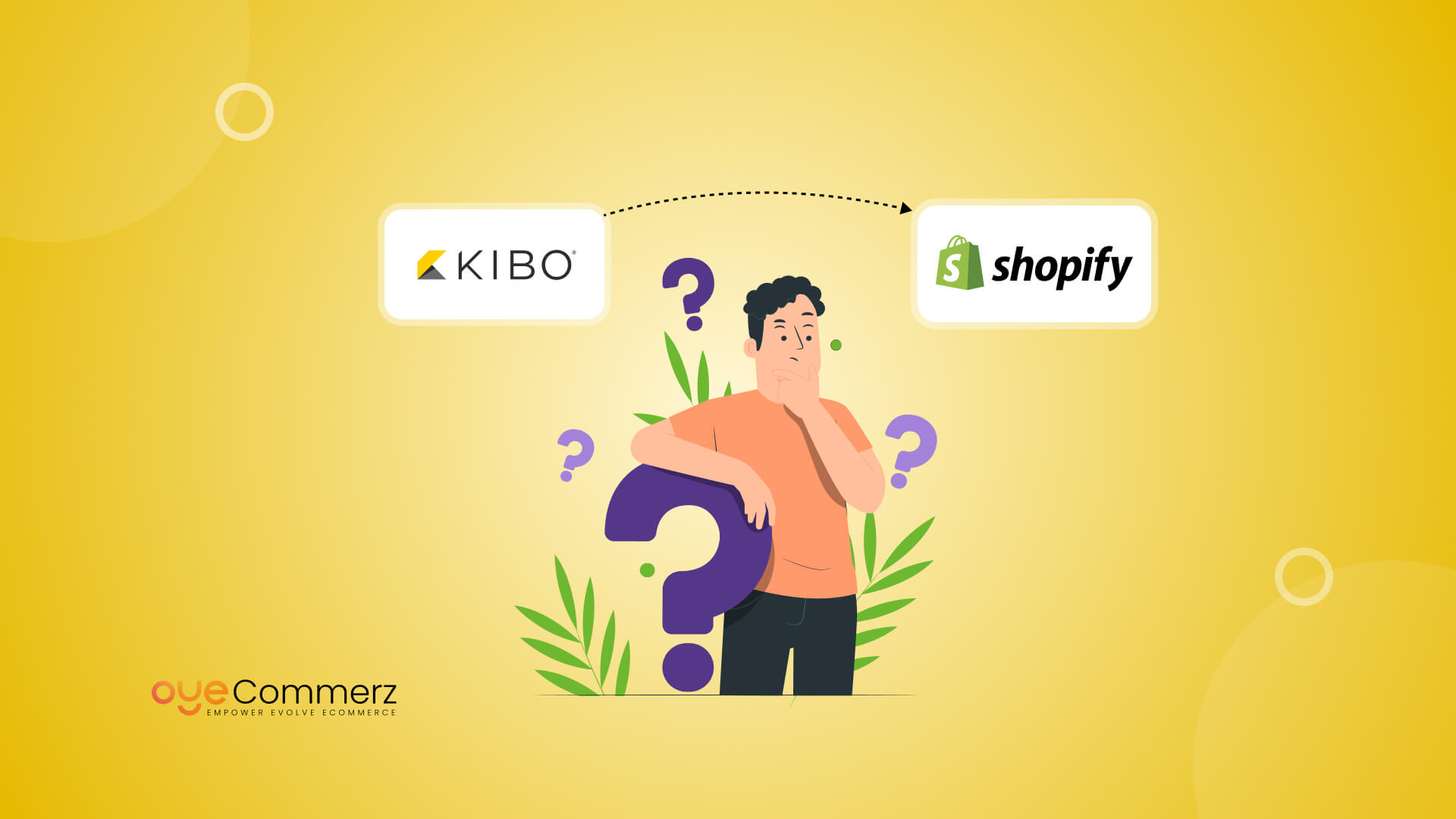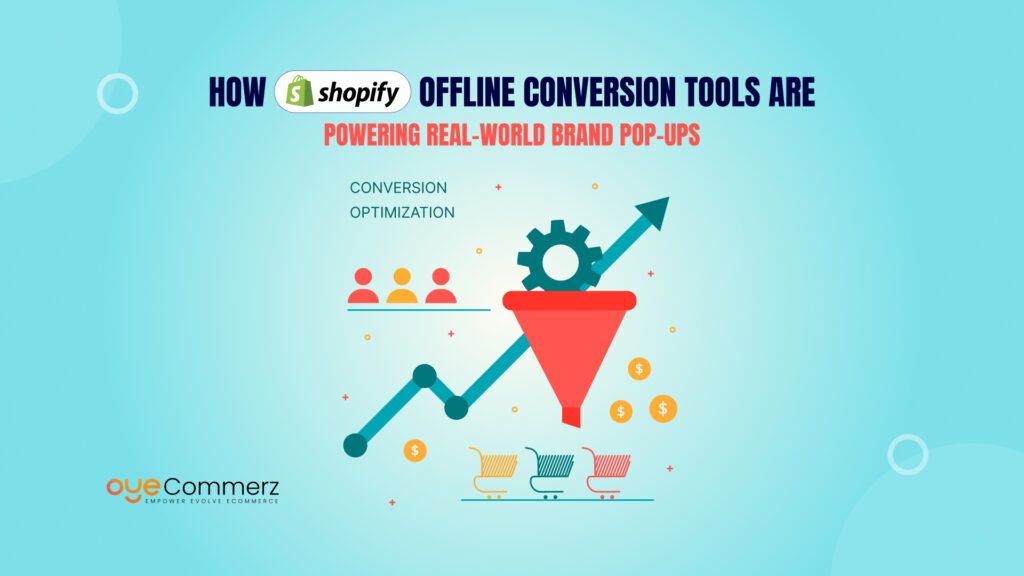Are you considering moving your eCommerce store from Kibo to Shopify? You’re not alone. Many modern entrepreneurs are making the switch to Shopify and for good reason. Shopify is more than just a platform; it’s a growth engine designed for today’s fast-paced world. With its sleek interface, extensive customization options, and an ever-growing app ecosystem, Shopify empowers you to scale faster and smarter. Whether you’re aiming to simplify operations, reduce costs, or supercharge your online presence, Shopify delivers the tools and flexibility you need. In this blog, we’ll explore why migrating from Kibo to Shopify could be the game-changing decision your business deserves. Ready to level up? Let’s dive in!
Table of Contents
ToggleOverview of Kibo and Shopify
What is Kibo?
Kibo is a cloud-based eCommerce platform that caters primarily to large enterprises with complex needs. It offers a comprehensive suite of features focused on delivering a unified commerce experience across multiple channels, including web, mobile, and in-store. Kibo’s platform is designed to provide businesses with flexibility, allowing them to customize their eCommerce strategies and manage product data effectively.
Key Features of Kibo:
- Unified Commerce: Kibo connects all sales channels (eCommerce, in-store, mobile, etc.) into one cohesive experience, helping businesses streamline operations and manage customer interactions.
- Advanced Product Data Management (PDM): The platform’s strong focus on product data management allows businesses to maintain accurate product information across multiple channels.
- Personalization and Marketing: Kibo includes powerful tools for personalizing the shopping experience, using customer data to drive targeted marketing campaigns and improve conversions.
- Omnichannel Support: Kibo is built to support complex omnichannel environments, making it ideal for businesses that sell both online and in physical stores.
- Enterprise-Level Customization: The platform offers a high degree of customization, enabling large enterprises to tailor their eCommerce operations to meet specific business needs.
Why Kibo is Popular Among Enterprise-Level Businesses: Kibo’s robust set of features, particularly around omnichannel commerce and product data management, has made it a popular choice for large businesses with complex operational needs. Enterprises that require deep customization and integration with other enterprise software systems (such as ERP, CRM, and supply chain management) find Kibo to be a versatile solution. Its ability to manage large volumes of products, customers, and transactions across multiple touchpoints is crucial for enterprises looking to maintain a competitive edge in the retail space.
What is Shopify?
Shopify is one of the world’s leading eCommerce platforms, known for its ease of use, scalability, and flexibility. Unlike Kibo, which focuses primarily on large enterprises, Shopify serves businesses of all sizes from small startups to large-scale enterprises. With over 1.7 million businesses using the platform globally, Shopify has earned a strong reputation for enabling businesses to create and manage online stores efficiently and effectively.
Key Features of Shopify:
- User-Friendly Interface: Shopify is known for its intuitive, drag-and-drop interface, which makes it easy for anyone regardless of technical skill level to set up and run an online store.
- Scalability: Shopify can accommodate businesses of all sizes, from solopreneurs to large enterprises. It offers different pricing plans, including Shopify Plus for high-volume businesses, ensuring it grows with your business.
- Customizable Themes: Shopify offers a variety of free and paid themes that are fully customizable to suit a business’s branding and functional needs.
- App Marketplace: The Shopify App Store offers thousands of apps for adding functionality to your store, from marketing automation to inventory management and accounting tools.
- Integrated Payment System: Shopify includes its own payment gateway, Shopify Payments, as well as integrations with third-party payment processors, making it easy for businesses to accept payments online.
- Mobile Optimization: Shopify’s themes and designs are responsive, meaning they are optimized for mobile devices, which is critical given the growing trend of mobile shopping.
- SEO and Marketing Tools: Shopify includes built-in tools for search engine optimization (SEO), email marketing, and social media integration to help businesses reach their target audience more effectively.
Why Shopify is Popular: Shopify’s popularity can be attributed to its user-friendly interface, scalability, and rich ecosystem of apps and integrations. It allows businesses to quickly set up an online store with minimal technical knowledge and easily scale as they grow. The platform’s strong emphasis on customer experience, mobile optimization, and extensive support resources make it a top choice for businesses seeking a flexible, cost-effective eCommerce solution. Additionally, Shopify’s ability to handle both B2C and B2B eCommerce, along with its robust marketing and sales tools, allows businesses to cater to a diverse range of customer needs.
Why Migrate from Kibo to Shopify?

1. The Limitations of Kibo
Understanding the limitations of Kibo is essential for enterprise decision-makers contemplating a migration. While Kibo offers several unified commerce capabilities, it often falls short in critical areas that affect business growth. Check out Kibo’s KPI metrics.
Key Features of Kibo
- Centralized Inventory Management: Allows businesses to manage inventory across multiple channels from a single platform.
- Multi-Channel Selling: Supports various sales channels, including e-commerce, in-store, and mobile.
Limitations of Kibo
- User Experience Challenges: The interface can be complex and unintuitive, leading to longer onboarding times for staff and operational inefficiencies.
- Customization Restrictions: Limited options for tailoring the platform to unique business needs can inhibit innovation and brand differentiation.
- Scalability Issues: As businesses grow, Kibo can struggle to handle increased traffic and order volume, resulting in potential lost sales and dissatisfied customers.
Industry Insight
According to e-commerce analyst Laura Jensen, “Platforms must evolve with the market, and Kibo often lacks the agility needed to keep pace with consumer expectations.” This observation reflects a growing concern among enterprises that are increasingly seeking more adaptive solutions.
Check out the in depth comparison on Shopify vs Kibo Based on Customer Base and Growth in the e-commerce market.
2. The Strategic Benefits of Shopify
Migrating to Shopify offers numerous strategic advantages tailored for enterprise-level businesses aiming to enhance their e-commerce capabilities.
User-Friendly Interface
Shopify’s intuitive design allows for efficient management, reducing the learning curve for employees. This ease of use translates into:
- Faster Onboarding: New staff can become productive quickly, reducing training costs.
- Simplified Operations: A clean interface leads to fewer errors and more streamlined workflows.
Extensive App Ecosystem
One of Shopify’s standout features is its extensive app marketplace, which enables businesses to customize their online stores to meet specific needs. Key aspects include:
- Integration with Third-Party Tools: Businesses can connect with various software solutions, such as CRM systems, email marketing tools, and analytics platforms.
- Enhanced Functionality: Apps offer features ranging from advanced analytics to social media integration, enabling businesses to optimize their operations.
Robust Scalability
Shopify Plus is designed for high-volume merchants, providing robust infrastructure that can handle spikes in traffic and sales. This scalability is crucial for enterprises anticipating growth:
- Support for Increased Traffic: Shopify can accommodate heavy user traffic, ensuring that performance remains optimal even during peak shopping periods.
- Global Reach: With support for multiple currencies and languages, Shopify enables businesses to expand internationally with ease.
Supporting Data
According to a recent report, “Businesses that migrate to Shopify often experience an average sales increase of 30% within the first year.” This statistic underscores the platform’s capacity to drive growth and improve overall performance.
3. Enhanced Functionality with Shopify
When you migrate from Kibo to Shopify, one of the most significant advantages is the enhanced functionality that Shopify offers.
Advanced Analytics and Reporting
Shopify provides comprehensive analytics tools that help businesses monitor their performance effectively. Key features include:
- Real-Time Data Tracking: Businesses can access real-time metrics on sales, customer behavior, and inventory levels, allowing for data-driven decision-making.
- Customizable Reports: Users can create tailored reports that focus on specific KPIs relevant to their operations.
Integrated Marketing Solutions
Shopify also excels in providing integrated marketing tools that can enhance customer engagement and boost sales. Key components include:
- Built-In SEO Features: Shopify’s SEO capabilities help businesses improve their visibility on search engines, attracting more organic traffic.
- Social Media Integration: Businesses can seamlessly connect their Shopify stores with social media platforms to streamline marketing efforts and enhance brand presence.
Omnichannel Selling Capabilities
Shopify supports omnichannel selling, allowing businesses to create a cohesive shopping experience across various platforms. This feature is crucial for engaging today’s consumers, who often switch between devices and channels.
Expert Perspective
E-commerce consultant Michael Rivera states, “The ability to leverage integrated marketing tools and omnichannel capabilities is essential for modern brands aiming to maximize their reach and engagement.” This perspective highlights Shopify’s relevance in the current market.
4. Financial Advantages of Migrating to Shopify
Cost considerations are critical for enterprises evaluating a migration. Shopify offers compelling financial benefits that can lead to significant savings.
Lower Total Cost of Ownership
Shopify’s subscription-based model typically results in lower upfront costs compared to Kibo. Key financial aspects include:
- Predictable Pricing: With clear subscription fees, businesses can better manage their budgets.
- Reduced Infrastructure Costs: Shopify eliminates the need for extensive server infrastructure, as it is a cloud-based solution.
Operational Cost Savings
The user-centric nature of Shopify can lead to reduced operational costs. For instance:
- Decreased Training Time: A simpler interface means that staff can become proficient more quickly, resulting in lower training expenses.
- Efficiency Improvements: Streamlined operations reduce the likelihood of errors, saving both time and money.
Financial Impact Data
Forrester’s research indicates that “enterprises that migrate to Shopify often see a reduction of up to 30% in total operational costs.” This figure emphasizes the financial viability of transitioning to Shopify.
5. Security: A Non-Negotiable Factor
As cybersecurity threats continue to rise, robust security features are essential for any e-commerce platform.
Shopify’s Security Protocols
Shopify prioritizes security, offering a range of robust features designed to protect both businesses and customers, including:
- PCI Compliance: Shopify meets stringent PCI compliance standards, ensuring secure transactions.
- Regular Security Updates: The platform frequently updates its security protocols to counter emerging threats, providing peace of mind for businesses.
Industry Insights on Security
Cybersecurity expert John Smith notes, “In today’s e-commerce environment, selecting a platform with strong security measures is critical for protecting customer data and maintaining trust.” This underscores the importance of security in any e-commerce decision.
6. The Migration Process: A Step-by-Step Guide
Migrating from Kibo to Shopify requires a approach to ensure a successful transition.
Key Steps in the Migration Process
- Assessment: Begin by evaluating your current Kibo setup, including data, sales channels, and workflows.
- Data Migration: Use reliable tools to ensure accurate data transfer to Shopify, safeguarding critical information.
- Design and Customization: Develop a design that aligns with your brand identity and customizes functionalities to meet your specific needs.
- Testing and Optimization: Conduct thorough testing to identify and rectify any issues before launching the new site.
Best Practices for Migration
To facilitate a smooth transition, consider partnering with a specialized agency like Oyecommerz. Explore Your Complete Guide to Kibo to Shopify Migration for comprehensive insights on the migration process.
7. Post-Migration Optimization Strategies
After migrating to Shopify, enterprises must focus on ongoing optimization to maximize performance.
Strategies for Continuous Improvement
- Performance Monitoring: Regularly analyze key performance indicators to identify areas for improvement and adjust strategies accordingly.
- A/B Testing: Implement A/B testing on crucial elements of your site to continually refine the user experience.
- Leveraging Shopify Resources: Utilize Shopify’s support network and resources to stay updated with the latest tools and best practices.
Community Engagement
Shopify has a vast community of developers and merchants who provide a wealth of resources for businesses seeking to optimize their operations.
8. Future-Proofing Your Business
In a rapidly changing digital market, future-proofing your business is essential for long-term success.
Why Choose Shopify?
- Continuous Innovation: Shopify is committed to regularly enhancing its platform, ensuring access to cutting-edge technologies.
- Robust Developer Community: A large community of developers means that ongoing support and innovative solutions are readily available.
Industry Insights on Future-Proofing
Tech analyst Emily Carter states, “Choosing a platform that prioritizes innovation and adaptability is essential for businesses looking to succeed in the long term.” This perspective reinforces the need for businesses to align with forward-thinking technologies.
9. Customer Experience: The Key to Retention
In today’s e-commerce environment, delivering an exceptional customer experience is crucial for building loyalty and retention.
Enhancing Customer Experience with Shopify
- Streamlined Checkout Process: Shopify offers an efficient checkout experience, which can significantly reduce cart abandonment rates.
- Personalization Capabilities: The platform allows businesses to create personalized experiences for customers, fostering loyalty and repeat business.
Expert Opinions on Customer Experience
Customer experience expert Sarah Thompson notes, “A seamless shopping experience can dramatically influence customer retention rates. Shopify excels in providing this seamless experience, underscoring the critical importance of user experience in e-commerce.
10. The Importance of Expert Partnerships
Choosing the right partner for your migration is a key factor that can greatly influence the success of your transition.
Why Oyecommerz?
- Expert Guidance: At Oyecommerz, we specialize in successful migration strategies from Kibo to Shopify, providing tailored solutions for enterprise-level businesses.
- Ongoing Support: We offer continuous post-migration support to ensure your business thrives on the Shopify platform.

Enhance Your E-Commerce Experience with Oyecommerz!
Our expert team specializes in seamless migrations from Unilog to Shopify, ensuring your online store operates at its best. Whether you need to enhance performance, streamline operations, or scale for future growth, we’re here to support every step of your transition.
Reach out to us today to learn how we can guide you through a smooth migration and help unlock your store’s full potential for long-term success!
Contact to Migrate your Site to Shopify Now
Conclusion
Migrating from Kibo to Shopify represents not just a technical shift but a strategic opportunity for enterprise-level businesses. By embracing Shopify’s user-friendly design, robust security features, and extensive customization options, organizations can unlock significant operational efficiencies and drive growth.
The evidence is clear: businesses that make the transition often experience marked improvements in both performance and customer satisfaction. As you consider the benefits of migrating to Shopify, remember that thorough planning and expert guidance are essential to maximizing your investment. By aligning your organization with a platform designed for flexibility and innovation, you position your business for success in an increasingly competitive digital landscape.



